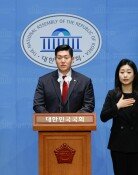Future of Economic Ministries
Future of Economic Ministries
Posted December. 20, 2008 02:21,
▽ Economic ministries under one umbrella
The Strategy and Finance Ministry will be in charge of budgeting and budget management previously done by the Planning and Budget Ministry. It will also draw up and adjust economic policies, manage government coffer, taxation and international finance previously done by the Finance and Economy Ministry.
The Finance and Economy Ministrys financial policies, however, will go to the Finance Commission, and consumer policies to the Fair Trade Commission. The Public Fund Oversight Commission will be eliminated.
Seemingly, the Finance Ministry is being downsized significantly and to be absorbed by the Planning and Budget Ministry, but in fact, a big, unified and powerful ministry is in the making.
The transition committee explained reasons for the formation of the Strategy and Finance Ministry, saying Coordination of policies of the existing Finance Ministry and Prime Ministers Office, which are not fully backed by government budget, is ineffective. And divided functions of budget, government treasury and taxation have made it difficult to maintain healthy finance of the government.
Apart from that, the division of work between the reinstated presidential chief economic secretary and the Strategy and Finance Ministry remains to be solved. An official from a private economic research institute said, When the economic chief, who knows what the president thinks, is at odds with the Strategy and Finance Ministry, who should have a bigger say? The situation could be confusing.
Rev. Gwak Seung-joon, a member of the committees planning and adjustment division, said, The Strategy and Finance Ministry calls the shots. And the chief economic secretary is a messenger who conveys the presidents economic philosophy to each ministry.
▽ Restructuring by function
Except for the Finance and Economy Ministry and the Planning and Budget Ministry, other ministries will be reorganized to deal with particular sectors, namely finance, industry, homeland development, transportation and logistics as well as agriculture and fisheries.
The Finance Commission will be in charge of the financial sector overseeing financial policies and the supervision of the sector.
The current financial supervisory system is three-tiered. The Finance and Economy Ministry, which holds the authority to make and amend relevant laws, is at the top, managing the system. The Financial Supervisory Commission is in charge of the supervision of the system and the Financial Supervisory Service carries out the supervisory task under the direction from the FSC.
This three-tier system was blamed for its inefficiency in supervision and the formulation of financial policies, which spawned financial regulations.
The presidential transition committee streamlined the system to two-tiered one. The Financial Supervisory Commission is to formulate financial policies, and to oversee the Korea Development Bank, the Industrial Bank of Korea, the Korea Credit Guarantee Fund and the Financial Intelligence Unit which were previously under the Finance Ministry.
The Chairman of the FSC will be banned from holding the chairmans post at the Financial Supervisory Service at the same time, to maintain a healthy relation between the institutions, which formulates and implements policies, respectively.
Yet the reshuffle plan stipulates that the chairman of the FSS is supervised by the chairman of the FSC, thereby raising a question as to whether the checks and balance in the system would work as intended.
The Knowledge Economy Ministry is to be established to deal with the industrial sector. The ministry will carry out the traditional task of the Commerce, Industry and Energy Ministry in addition to IT policies that are currently conducted by the Information and Communication Ministry and R&D policies currently under the control of the Science and Technology Ministry.
There has been strong arguments for the need for the Information and Communication Ministry, yet the transition committee rebutted saying, There is no ministry dealing with IT sector in Finland, although the country boasts the worlds best mobile manufacturer, Nokia. The committee said that IT technology must be developed in close relations to other industries including the automobile industry.
The Construction and Transportation Ministry will be merged with the Maritime Affairs and Fisheries Ministry to become the Homeland and Maritime Affairs Ministry, which will deal with maritime development, harbor construction projects and sea lane transportation and logistics. The Homeland and Maritime Affairs Ministry will likely lead the Grand Canal project.
The Agriculture and Forestry Ministry will be expanded to take over the task of the Maritime Affairs and Fisheries Ministrys fisheries policy and the Health and Welfare Ministrys food industry policy to become the Food, Agriculture, Forestry and Fisheries Ministry, which will strategically foster the food industry and consolidate food administration.
koh@donga.com







